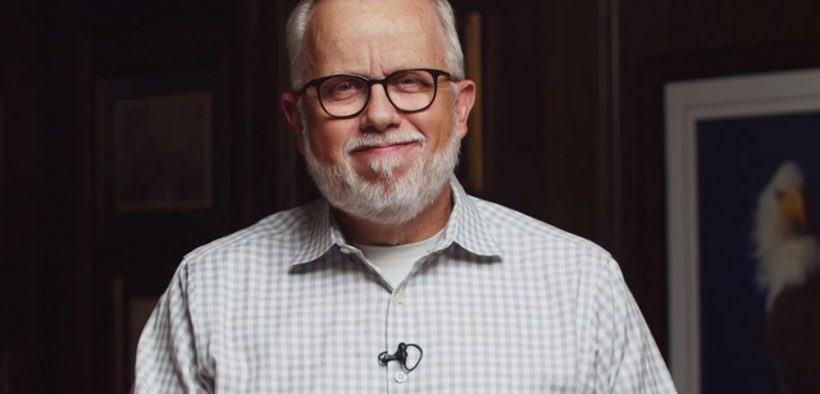Alabama Pastor Ed Litton, Known for Racial Reconciliation Work, Joins SBC Presidential Race

The Rev. Ed Litton, an Alabama pastor known for his work on racial reconciliation, will be nominated for president of the Southern Baptist Convention this summer.
Litton enters an increasingly crowded field for SBC president, joining Southern Baptist Theological Seminary President Albert Mohler, Georgia pastor Mike Stone and Randy Adams, executive director of the Northwest Baptist Convention.
Fred Luter, the only Black pastor to serve as president of the SBC, announced his intention to nominate Litton, pastor of First Baptist Church North Mobile, this week.
The two have been friends for more than 20 years and met when they swapped pulpits for a “Racial Reconciliation Sunday” event.
“From there, our relationship developed to more than just colleagues to bring races together,” Luter told Baptist Press, the SBC’s official news organization. “We both shared the hope of drawing people closer to a relationship with Jesus Christ and then growing disciples for Christ. In both of our churches our focus has been the same all of these years.”
Luter and Litton are among the signers of “Justice, Repentance and the SBC,” the December 2020 statement released after the heads of six Southern Baptist seminaries called critical race theory, a set of ideas about systemic racism, “incompatible” with the convention’s statement of faith.
Access to MinistryWatch content is free. However, we hope you will support our work with your prayers and financial gifts. To make a donation, click here.
The 2021 SBC presidential race comes at a time of tension for the nation’s largest Protestant denomination. The denomination has declined by close to 2 million members since 2006 and its rate of baptisms has been stagnant for years. Southern Baptists have also been divided over issues of race and immigration and support for former President Donald Trump. Several prominent Black pastors have said their churches will leave the denomination over issues of race.
Mohler, a key player in the conservative movement that took over the SBC in the 1980s and 1990s, appeared to be a shoo-in for SBC president last year. He was seen at the time as a true conservative, but not closely allied with Trump.
Then the SBC annual meeting was canceled due to COVID-19, meaning that current President J.D. Greear, a North Carolina megachurch pastor, would remain in office for another year.
Since then, Mohler changed his mind, going from being a “Never Trumper” to backing Trump’s reelection and denouncing CRT. Both moves alienated Black pastors in the convention.
At the same time, Mohler and other top SBC leaders have been criticized by a group called the Conservative Baptist Network for not being conservative enough and for allowing “unbiblical agendas” such as social justice into the convention.
Stone, one of the other SBC presidential candidates, is a member of the CBN’s steering committee.
A former president of the convention’s executive committee, Stone is chairing an investigation of Russell Moore, a “Never Trumper” who heads the SBC’s Ethics and Religious Liberty Commission.
Stone told Baptist Press that he was not running against anyone but was running toward God’s will.
“I did not seek this out; I feel like it’s a case of the position seeking the person,” said Stone, pastor of Emmanuel Baptist Church in Blackshear, Georgia. “But God confirmed this in my heart and my wife’s heart through a set of circumstances.”
Adams, who is little known in national circles, announced Wednesday (Jan. 20) that he will be nominated for SBC president. Writing on his blog, he said he was running to end what he called mismanagement and a “lack of transparency and accountability in some of our SBC entities.”
He also lamented the decline in baptisms, membership and giving in the denomination and made a series of suggestions on how to turn things around. Among his ideas is involving more small churches in decision-making and moving to virtual national meetings, rather than in-person events.
“Far too many pastors and churches feel shut out of the decision-making process that is controlled by a handful of elites,” he wrote.
Ed Stetzer, a Southern Baptist pastor and executive director of the Billy Graham Center at Wheaton College, said that many Southern Baptists are worried about the future of their denomination. They want to work together on ministry and mission and don’t want to be divided by politics or other issues, he said.
Most Southern Baptists, Stetzer said, agree on the denomination’s statement of faith, known as the Baptist Faith and Message. He doesn’t think the denomination is in danger of splitting.
“I don’t think the SBC will split,” he said. “If it splinters it will be a small movement of people who do not think that the Baptist Faith and Message is enough. The denomination has to decide whether it will live by that statement of faith or move further to the right.”
More candidates are expected to announce their candidacy for SBC president in the coming months. In 2008, six leaders ran for president of the convention.



